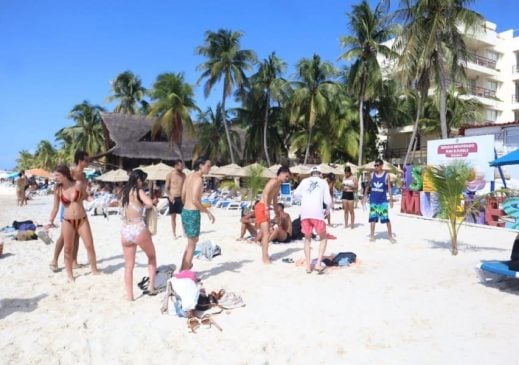Isla Mujeres, Q. R. — The main fishing cooperative of Isla Mujeres has agreed to suspend the fishing of sharks for several months. The announcement was made by Saving our Sharks who say they have been working with the island fishermen for more than six years.
The agreement to suspend fishing will not only keep 1,200 hooks out of the sea, it will also help to rehabilitate shark populations and promote non-extractive use.
Cooperative Kab Xok and the organization Saving Our Sharks A.C. announced the agreement earlier this week. Saving Our Sharks says “this initiative that constitutes an exploitation strategy that aims to curb shark fishing in Quintana Roo for the rehabilitation of the populations of different shark species and in this way, generate alternatives and actions for their conservation and sustainable use.”
“The synergy between fellow Isla Mujeres fishermen and Saving Our Sharks began six years ago with various shark monitoring projects. This combination of experiences has generated knowledge and very positive results for research and management of Natural Protected Areas of species that inhabit and visit these areas,” they explained.
Luis Lombardo Cifuentes, the General Director of the Saving Our Sharks, says the fishermen of Isla Mujeres have created the Kab Xok (shark in Mayan) Cooperative, specifically aimed at developing a sustainable management of marine species, in coordination with different federal authorities and the Mexican Caribbean Biosphere Reserve.
The cooperative is made up second and third generation shark fishermen from the first fishermen and founders of Isla Mujeres. The cooperative fishermen will be financially compensated to stop shark fishing activities.
Lombardo Cifuentes explained that between 185 to 190 tons of sharks are fished in the state each year, but are only registered figures by the 13 known permit holders in the state. He says in the case of poaching, those figures are much higher.
“It is known that at least 1,800 specimens are captured a year in the state to be sold in restaurants. The areas where shark fishing permits are concentrated are in the north of the state around Holbox, Isla Mujeres as well as Playa del Carmen,” he explained.
Lombardo Cifuentes pointed out that the sharks sighted in the region do not usually live here, but are simply passing through. “We know this due to a project that the association has in which we have managed to track 48 sharks and follow them on their migration route which can reach North Carolina or Honduras,” he explained.
“To support the greater reproduction of sharks, an initiative was created with the Xab Kok Cooperative, who are responsible for up to 70 percent of the local shark fishing, who have agreed to leave 1,200 hooks out of service during the next several months. They will be financially compensated to avoid losses,” he said.


